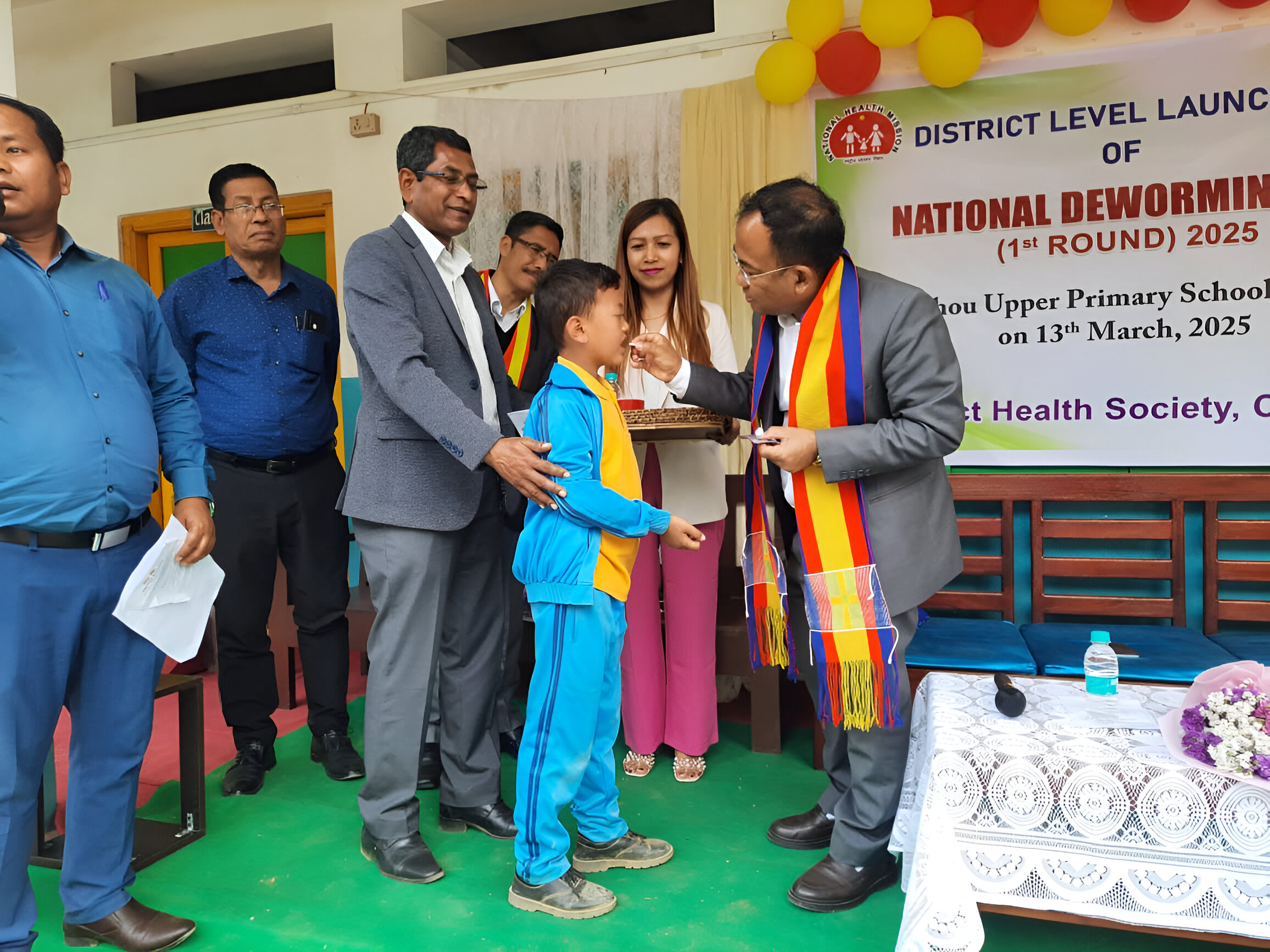Manipur’s Chandel District Initiates National Deworming Drive
Summary of the News Article
On March 13, 2025, Chandel district in Manipur launched the first round of the District-Level National Deworming Day at Japhou Upper Primary School. The event, organized by the District Health Society, aimed to combat parasitic worm infections among children aged 1–19 years. Dignitaries including Deputy Commissioner N. Nandakumar Singh, ZEO Yumnam Hemchandra Singh, and CMO Dr. Joyson Matthew Monsang emphasized the importance of deworming, hygiene, and sanitation. Albendazole tablets were administered across schools, Anganwadi Centres, and health units, with a mop-up round scheduled for March 20 to cover any missed children.
Introduction
Imagine a world where children, full of potential and dreams, are held back not by lack of ambition or opportunity, but by tiny, unseen parasites lurking within them. It’s a reality more common than we’d like to admit. But here’s the silver lining: communities worldwide are taking a stand. One shining example is Chandel district in Manipur, India. They’ve embarked on a mission to ensure their children are free from these silent adversaries. Let’s delve into this inspiring journey.
Understanding the Menace: Parasitic Worm Infections
What Are Parasitic Worm Infections?
Parasitic worms, or helminths, are sneaky little creatures that find their way into human hosts, especially children, causing a slew of health issues. Think of them as uninvited guests at a party, consuming resources and leaving a mess behind. The most common culprits? Soil-transmitted helminths (STH) like roundworms, hookworms, and whipworms.
Impact on Children’s Health
You might wonder, “How bad can it be?” Well, these infections can lead to malnutrition, anemia, stunted growth, and impaired cognitive development. Imagine trying to concentrate in school while feeling constantly fatigued and unwell. It’s like trying to run a marathon with a ball and chain strapped to your ankle.
The Global and National Scenario
A Widespread Challenge
Globally, over 1.5 billion people are affected by STH infections. That’s nearly a quarter of the world’s population! In India, the numbers are staggering, with millions of children at risk, particularly in regions with inadequate sanitation and hygiene practices.
India’s Response: National Deworming Day
Recognizing the gravity of the situation, the Government of India launched the National Deworming Day (NDD) initiative in 2015. Held biannually, this program aims to deworm children aged 1–19 years across the country. It’s like giving these kids a fresh start, free from the clutches of these pesky parasites.
Chandel District’s Commitment to a Healthier Future
The Grand Launch
On March 13, 2025, the serene village of Japhou witnessed a significant event. The District Health Society of Chandel kick-started the first round of the District-Level National Deworming Day at Japhou Upper Primary School. The atmosphere buzzed with enthusiasm and hope.
Who’s Who at the Event
The launch wasn’t just another date on the calendar. It saw the convergence of key figures:
- Chief Guest: Deputy Commissioner N. Nandakumar Singh, IAS
- Guest of Honour: ZEO Chandel, Yumnam Hemchandra Singh
- Functional President: CMO Chandel, Dr. Joyson Matthew Monsang
- Other Dignitaries: Mina Nula (Inspector of Schools), Martha Saka (Supervisor, ICDS Cell, Chandel)
Their presence underscored the district’s unwavering commitment to the health and well-being of its younger population.
Spreading the Word: Awareness and Education
The Power of Knowledge
Dr. RD. Anna Niwarhring, the District Nodal Officer for Child Health in Chandel, took center stage to shed light on the adverse effects of parasitic worm infections. She emphasized that beyond administering deworming tablets, the campaign’s success hinges on:
- Awareness: Educating communities about the dangers of worm infections.
- Sanitation: Promoting the use of clean toilets and proper waste disposal.
- Hygiene Practices: Encouraging regular handwashing, especially before meals and after using the restroom.
- Safe Food and Water: Ensuring consumption of uncontaminated food and clean drinking water.
It’s like building a fortress; while deworming tablets act as the soldiers defending against invaders, these practices form the sturdy walls that keep threats at bay.
The Role of Schools and Anganwadi Centres
Educational institutions and Anganwadi Centres (AWCs) are at the forefront of this battle. They serve as the primary venues for:
- Administering Deworming Tablets: Ensuring every child receives the necessary medication.
- Disseminating Information: Teachers and Anganwadi workers act as torchbearers, enlightening students and parents about the importance of deworming and maintaining hygiene.
The Deworming Drive: Execution and Coverage
A Two-Phase Approach
The district’s strategy is both meticulous and inclusive:
- Initial Round (March 13): Targeting all children aged 1–19 years across schools, AWCs, and health units.
- Mop-Up Round (March 20): Ensuring no child is left behind, this phase focuses on those who missed the initial round.
It’s akin to painting a wall; the first coat covers most areas, but the second ensures every nook and cranny is addressed.
The Magic Pill: Albendazole
At the heart of this campaign lies Albendazole, the deworming tablet. This medication is:
- Safe: Minimal side effects, making it suitable for mass administration.
- Effective: Targets a broad spectrum of parasitic worms.
- Easy to Administer: Oral consumption ensures hassle-free distribution.
Think of Albendazole as a trusty broom, sweeping away the unwanted guests from the body’s system.
Collaborative Efforts: A Community United
Interdepartmental Synergy
The success of such a massive campaign hinges on collaboration. In Chandel, various departments joined forces:
- Health Department: Spearheading the initiative and providing medical expertise.
- Education Department: Facilitating the program’s rollout in schools and ensuring student participation.
- Women and Child Development Department: Overseeing the implementation in AWCs and focusing on younger children.
It’s a beautiful symphony where each instrument plays its part, creating harmonious music that resonates with the community’s well-being.
Training and Capacity Building
Before the tablets reached the children, extensive training sessions were conducted for:
- Teachers: Equipping them with knowledge about deworming and its significance.
- Anganwadi Workers: Preparing them to handle the administration of tablets and address parental concerns.
- Health Workers: Ensuring they can manage any adverse reactions and provide accurate information.
Conclusion: A Brighter, Healthier Tomorrow
The launch of the District-Level National Deworming Day in Chandel is not just a health initiative; it is a powerful statement of hope, resilience, and community spirit. By taking proactive measures against parasitic infections, Chandel is paving the way for a future where every child can grow up healthy, strong, and ready to face the challenges of life.
This campaign exemplifies what can be achieved when governments, communities, and local stakeholders unite with a common goal. The success of this initiative serves as a model for other regions, proving that with the right approach, even the smallest interventions can lead to monumental changes.
As we look forward to the mop-up round on March 20, 2025, let’s celebrate this milestone and remain committed to creating a world where our children can thrive, free from the clutches of preventable diseases. With determination, collaboration, and a focus on long-term sustainability, the vision of a healthier, more prosperous Manipur is well within reach.
FAQs
- What is the primary goal of the National Deworming Day in Chandel?
- The main goal is to eliminate parasitic worm infections among children aged 1–19 years by administering Albendazole tablets and promoting better hygiene and sanitation practices.
- How is the deworming campaign executed in Chandel?
- The campaign involves a two-phase approach: an initial round on March 13, 2025, where tablets are administered at schools, Anganwadi Centres, and health units, followed by a mop-up round on March 20 to reach children who were missed initially.
- Why is deworming important for children’s health?
- Parasitic worm infections can cause malnutrition, anemia, stunted growth, and cognitive impairments, thereby hindering a child’s ability to learn and grow. Deworming helps remove these infections, enabling healthier development.
- How does the campaign ensure community involvement?
- The initiative involves extensive awareness campaigns, community meetings, and training sessions for teachers and health workers, ensuring that parents and local stakeholders are fully engaged in the process.
- What long-term impact can this deworming initiative have on the community?
- By improving children’s health, the initiative can lead to better educational outcomes, enhanced productivity, and a stronger overall community, ultimately contributing to long-term socioeconomic development.




